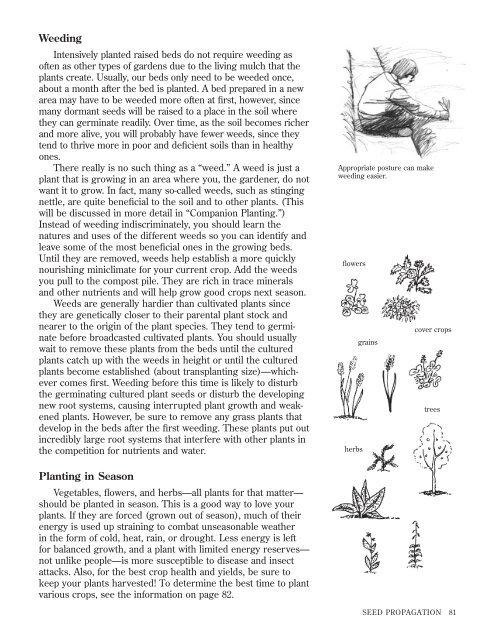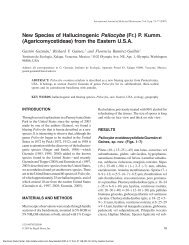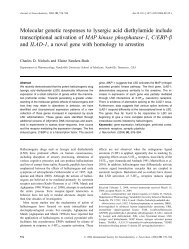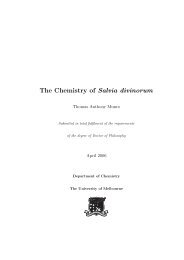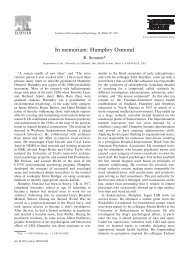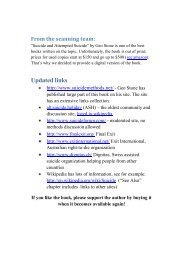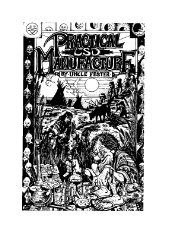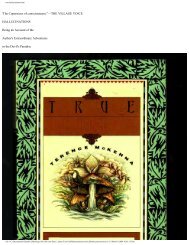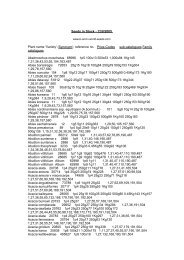How to Grow More Vegetables : And Fruits, Nuts ... - Shroomery
How to Grow More Vegetables : And Fruits, Nuts ... - Shroomery
How to Grow More Vegetables : And Fruits, Nuts ... - Shroomery
Create successful ePaper yourself
Turn your PDF publications into a flip-book with our unique Google optimized e-Paper software.
Weeding<br />
Intensively planted raised beds do not require weeding as<br />
often as other types of gardens due <strong>to</strong> the living mulch that the<br />
plants create. Usually, our beds only need <strong>to</strong> be weeded once,<br />
about a month after the bed is planted. A bed prepared in a new<br />
area may have <strong>to</strong> be weeded more often at first, however, since<br />
many dormant seeds will be raised <strong>to</strong> a place in the soil where<br />
they can germinate readily. Over time, as the soil becomes richer<br />
and more alive, you will probably have fewer weeds, since they<br />
tend <strong>to</strong> thrive more in poor and deficient soils than in healthy<br />
ones.<br />
There really is no such thing as a “weed.” A weed is just a<br />
plant that is growing in an area where you, the gardener, do not<br />
want it <strong>to</strong> grow. In fact, many so-called weeds, such as stinging<br />
nettle, are quite beneficial <strong>to</strong> the soil and <strong>to</strong> other plants. (This<br />
will be discussed in more detail in “Companion Planting.”)<br />
Instead of weeding indiscriminately, you should learn the<br />
natures and uses of the different weeds so you can identify and<br />
leave some of the most beneficial ones in the growing beds.<br />
Until they are removed, weeds help establish a more quickly<br />
nourishing miniclimate for your current crop. Add the weeds<br />
you pull <strong>to</strong> the compost pile. They are rich in trace minerals<br />
and other nutrients and will help grow good crops next season.<br />
Weeds are generally hardier than cultivated plants since<br />
they are genetically closer <strong>to</strong> their parental plant s<strong>to</strong>ck and<br />
nearer <strong>to</strong> the origin of the plant species. They tend <strong>to</strong> germinate<br />
before broadcasted cultivated plants. You should usually<br />
wait <strong>to</strong> remove these plants from the beds until the cultured<br />
plants catch up with the weeds in height or until the cultured<br />
plants become established (about transplanting size)—whichever<br />
comes first. Weeding before this time is likely <strong>to</strong> disturb<br />
the germinating cultured plant seeds or disturb the developing<br />
new root systems, causing interrupted plant growth and weakened<br />
plants. <strong>How</strong>ever, be sure <strong>to</strong> remove any grass plants that<br />
develop in the beds after the first weeding. These plants put out<br />
incredibly large root systems that interfere with other plants in<br />
the competition for nutrients and water.<br />
Planting in Season<br />
<strong>Vegetables</strong>, flowers, and herbs—all plants for that matter—<br />
should be planted in season. This is a good way <strong>to</strong> love your<br />
plants. If they are forced (grown out of season), much of their<br />
energy is used up straining <strong>to</strong> combat unseasonable weather<br />
in the form of cold, heat, rain, or drought. Less energy is left<br />
for balanced growth, and a plant with limited energy reserves—<br />
not unlike people—is more susceptible <strong>to</strong> disease and insect<br />
attacks. Also, for the best crop health and yields, be sure <strong>to</strong><br />
keep your plants harvested! To determine the best time <strong>to</strong> plant<br />
various crops, see the information on page 82.<br />
Appropriate posture can make<br />
weeding easier.<br />
flowers<br />
herbs<br />
grains<br />
cover crops<br />
trees<br />
SEED PROPAGATION 81


